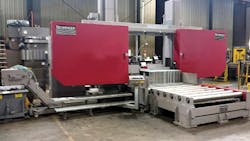High-Flexibility Sawing Systems for Ellwood Specialty Steel
To a very large extent, producing forgings effectively requires a high-throughput process; issues of quality and production cost are closely related — but emphasizing uptime and producing forgings in sufficient volume to meet demand is a primary consideration. Ellwood Specialty Steel Co. in New Castle, PA, is one of the largest-volume forging producers in the North American market, so it’s reasonable to believe the operators there are attentive to uptime.
More than that, ESS is an integrated operation — steelmaking, ingot casting, heating, forging, heat treating, and machining — so the scope of “uptime” is extensive.
Uptime can only be maintained if the level of performance is maintained, and that requires the operators to monitor product quality and production cost. Consider, too, that ESS produces a range of high-value, difficult-to-process materials that challenge the consistency of any production sequence: mold tool steels, hot-working steels, forging die steels, cold working tool steels, as well as alloy steel and aluminum.
The forging operations at ESS include four hydraulic presses, supported by automated forge heating furnaces, and manipulators, so keeping all this operating at a high level of throughput, with production- and cost-efficiency demands a high-performance and flexible billet-feeding process
Recently, Behringer Saws Inc. delivered two semi-automatic bandsaws to Ellwood Specialty Steel, to cut a variety of specialty steel feedstock for the forging operation. Behringer supplied an HBP-800 and an HBP-1500/1800 to the Pennsylvania forger in March.
The Behringer HBP-800 has a rigid, box-type machine base with dual columns and a solid, cast bow frame. It has fully automated hydraulic blade tensioning and automatic saw frame height positioning, and is able to cut feedstock measuring up to 31.5×31.5 in.
The HBP-1500/1800 is a larger, dual-column saw with auto-feed control and ball screws for downfeed stability. It’s able to cut with bi-metal or carbide-tipped saw blades, depending on the material requirements. With a traversable saw frame, it is able to cut materials measuring up to 59.0×70.1 in.
“Adding the Behringer saws to our production line significantly increased our capacity to process large forgings. We are very impressed with the quality, rigidity, and performance of these saws,” noted Gary DeBlasio, operations manager at ESS.
About the Author
Robert Brooks
Editor/Content Director - Endeavor Business Media
Robert Brooks has been a business-to-business reporter, writer, editor, and columnist for more than 20 years, specializing in the primary metal and basic manufacturing industries. His work has covered a wide range of topics including process technology, resource development, material selection, product design, workforce development, and industrial market strategies, among others.
Currently, he specializes in subjects related to metal component and product design, development, and manufacturing—including castings, forgings, machined parts, and fabrications.
Brooks is a graduate of Kenyon College (B.A. English, Political Science) and Emory University (M.A. English.)

